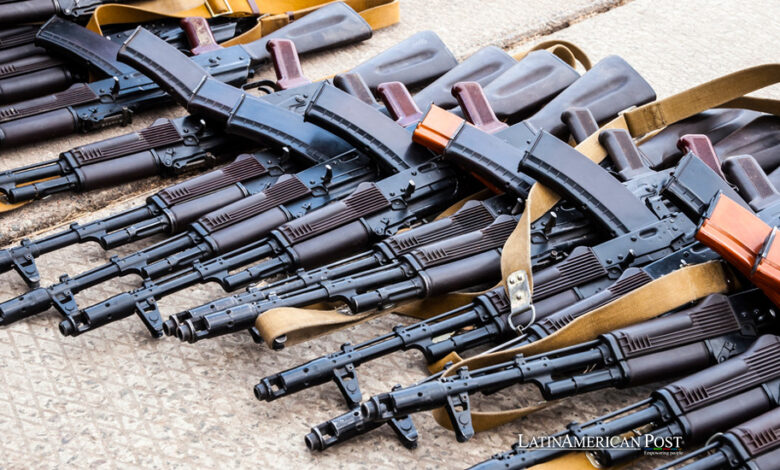Mexico Allowed to Pursue Legal Battle Against U.S. Gun Dealers

A U.S. judge has empowered Mexico to pursue a lawsuit against five Arizona gun dealers, accusing them of fueling drug cartel violence by trafficking weapons across the border, challenging the firearms industry’s legal protections, and spotlighting broader cross-border issues.
Mexico’s Legal Victory Against Arizona Gun Dealers
In a landmark decision, U.S. District Judge Rosemary Marquez in Tucson, Arizona, has ruled in favor of the Mexican government, allowing it to proceed with a lawsuit against five Arizona gun dealers. This case accuses these dealers of contributing to the trafficking of weapons and ammunition used by drug cartels, exacerbating the violence that plagues both sides of the U.S.-Mexico border. This ruling challenges the long-standing legal protections enjoyed by the firearms industry in the United States. It could set a significant precedent affecting gun control and cross-border crime in the region.
The lawsuit, filed in 2022, targets Diamondback Shooting Sports Inc., SnG Tactical LLC, Loan Prairie LLC, Ammo A-Z LLC, and Sprague’s Sports Inc. It contests that these dealers, under the guise of legal operations, have facilitated the flow of military-style assault weapons, such as the AR-15, and ammunition to drug cartels through illegal practices, including sales to straw purchasers.
The ruling comes as a pivotal moment in the ongoing battle against arms trafficking and its deadly consequences in Latin America. The Mexican government’s allegations suggest a pattern of reckless and unlawful conduct by these gun dealers, contributing to the severe and ongoing security crisis in Mexico and potentially other Latin American countries plagued by cartel violence.
Challenging Legal Norms
Judge Marquez’s decision to allow the lawsuit to proceed, despite the gun dealers’ defense under the Protection of Lawful Commerce in Arms Act (PLCAA), marks a critical juncture. The PLCAA has historically provided broad immunity to the firearms industry from lawsuits related to the misuse of their products. However, Marquez indicated that Mexico’s claims plausibly fall outside the PLCAA’s protective scope, particularly if the dealers violated various U.S. firearm-related laws and thereby caused harm to Mexico.
While the judge dismissed specific claims, including allegations of racketeering and public nuisance, the heart of Mexico’s lawsuit stands firm. This development has been met with optimism by Mexico’s legal team and governmental officials, who are determined to demonstrate in court the extent of the gun dealers’ accountability for their alleged role in fueling violence and instability.
The lawsuit is not just a legal battle but also a significant political and social statement, reflecting the Mexican government’s intensified efforts to curb the flow of illegal firearms from the U.S., which are often linked to drug cartel operations. This legal action signifies a broader, more aggressive strategy to tackle the sources of weapons that arm these dangerous groups, contributing to the cycle of violence affecting many Latin American countries.
The case against the Arizona gun dealers is part of a larger narrative where Mexico, and by extension, Latin America, is grappling with the impact of U.S. gun policies and market practices on its internal security. The issue of gun trafficking is a critical point of contention in U.S.-Latin American relations, with implications for diplomacy, security cooperation, and efforts to combat transnational organized crime.
Mexico’s pursuit of justice in U.S. courts underscores the complexities of addressing cross-border crime in a globalized world where legal jurisdictions and national interests often intersect and clash. It highlights the need for international cooperation and robust legal frameworks to combat the illicit arms trade that fuels violence in Latin America.
The ruling also resonates with a broader audience, including advocacy groups and citizens in both the U.S. and Latin America, who are increasingly concerned about the consequences of lax gun control laws and the ease with which firearms can cross international borders and end up in the hands of criminal organizations.
Continued Legal Drama
This lawsuit, following closely on the heels of Mexico’s legal action against U.S. gun manufacturers, reflects a growing awareness and activism around the issue of gun trafficking and its deadly impact. The revival of the lawsuit against gun manufacturers by a U.S. appeals court adds another layer to this unfolding legal drama, with potential repercussions for the firearms industry and gun control advocacy in both the United States and Latin America.
As this legal battle progresses, it will undoubtedly continue to draw attention to the intricate web of issues surrounding gun trafficking, border security, and international law. The outcome could influence future policies and cooperation between the U.S. and Latin American countries in their joint efforts to combat organized crime and ensure regional stability.
Also read: Mexico’s Workweek Reduction Dilemma
The decision to allow Mexico’s lawsuit to move forward represents a significant moment in the ongoing struggle against gun violence and trafficking in Latin America. It challenges established legal norms in the U.S. and opens the door for a broader discussion on international responsibility and the role of the firearms industry in cross-border crime. As this case unfolds, it will likely become a landmark in the efforts to forge a safer, more cooperative hemispheric approach to combating the scourge of drug cartel violence and the illicit arms trade.





